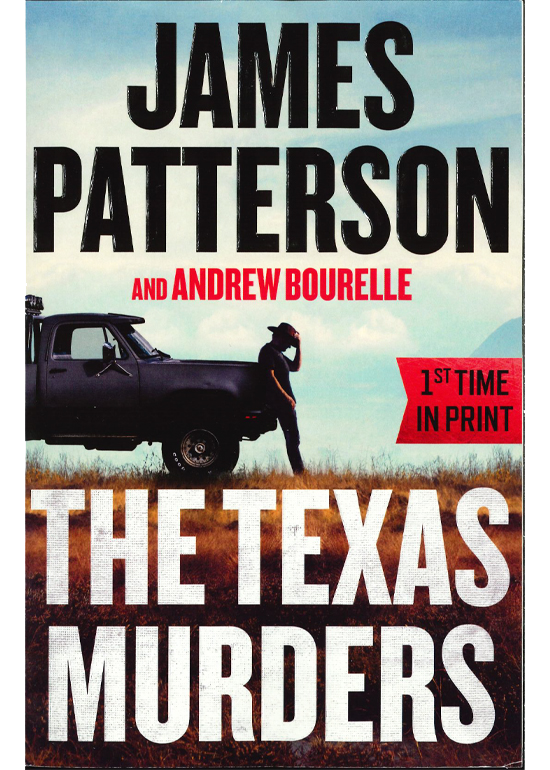
The Texas Murders
by James Patterson and Andrew Bourelle
New York: Little, Brown, 2025.
406 pp. $19.99 Paperback.
Reviewed by
William Jensen
“The fights and chases are clean and well written, and the shoot-outs are vivid. There is little dullness, and unlike the previous books in the series, The Texas Murders has some grizzly moments. These scenes, gruesome and scary, echo the ’90s thrillers Along Came a Spider and Kiss the Girls, which made Patterson a household name.”
In their third collaboration, Patterson and Bourelle continue the adventures of Texas Ranger Rory Yates in the best book of the series. While The Texas Murders has a similar plot and tone to the first two novels, Patterson and Bourelle seem more comfortable and familiar with Yates as a protagonist, and they have put him in more complex situations and relationships than before. It is fast-paced, but there is a darkness around the edges of the narrative that make this mystery stand out.
For his newest adventure, Yates dives into a series of missing women whose cases have either gone cold or have never been taken seriously in the first place. Patterson and Bourelle broadly address violence against women, foregrounding the situation of Indigenous women across different communities. Since the missing women are Tigua, Kickapoo, Ute, and Navajo, Yates joins forces with Tigua Tribal Police officer Ava Cruz who is a strong supporting character. Yates also works with Carlos Castillo, a Texas Ranger (with Kickapoo and Comanche heritage) whose sense of humor confuses and charms Yates. In the previous novels, Yates came across as too clean and perfect for me—and he remains shiny and unflappable—but in The Texas Murders, he confronts crimes, and a history of crimes, against an entire people that force him to face a landscape of racism, sexism, and brutality.
The Texas Rangers occupy a strange space in the Lone Star State’s legacy. For every comic book or old-time radio show glorifying their exploits, there is a dozen horrifying accounts of their crimes against people of color. When Ava tells Yates, “Your organization has a long history of wrong-doings against Indians,” Yates is taken aback. She challenges him. She challenges the badge and the title that define him. But even Yates knows that “not everything in the Rangers’ history is something to be proud of.” Of course, Patterson and Bourelle are not aiming for revisionist literature—this is supposed to be a fun, engaging thriller—but I wish the novel had gone a tiny step further with the emotional turmoil of Yates, a good man trying to do good things within an agency that has caused a lot of pain without accountability.
Still, Yates aims to find the Indigenous women who have gone missing and hopefully bring some home alive. He and Ava leave Texas and travel into Colorado and into Arizona on their crusade. Currently, there are thousands of Indigenous women reported missing across the United States and Canada, and murder is the third leading cause of death for Native women. The numbers are shocking. Though Patterson and Bourelle keep the action heavy and social commentary light, the crimes that Yates and his friends investigate allow for moments of reflection and angst, which keep the novel emotionally gripping.
The fights and chases are clean and well written, and the shoot-outs are vivid. There is little dullness, and unlike the previous books in the series, The Texas Murders has some grizzly moments. These scenes, gruesome and scary, echo the ’90s thrillers Along Came a Spider and Kiss the Girls, which made Patterson a household name.
My biggest complaint is that there are some revelations and twists near the end that do not seem to fit thematically. This isn’t to say that they’re disappointing or contrived as much as they lack a deeper sense of consequence for the characters and, at their worst, feel like requirements instead of something shocking. Regardless, even these reveals are action-packed and a cause for swift reading.
James Patterson has been criticized by some for being too prolific and for co-authoring a bulk of his books. I read his memoir, James Patterson by James Patterson, when it came out, and, like Stephen King’s On Writing, it shrugs at comments regarding genre, labels, prestige, or literary awards and instead shows a craftsman’s devotion to writing and words and stories. Patterson wants to do one thing with his books, and that’s keep the reader turning the pages, and I think he and Bourelle have succeeded at that task once again. However, I am curious to see if the two might team up on a project outside of Rory Yates, even outside of Texas. I think they could easily create a new protagonist with new mysteries that could bring down the house.
William Jensen is the author of Cities of Men, and his short fiction has appeared in North Dakota Quarterly, The Texas Review, Mystery Tribune, and elsewhere. He is the editor of Southwestern American Literature and Texas Books in Review.
